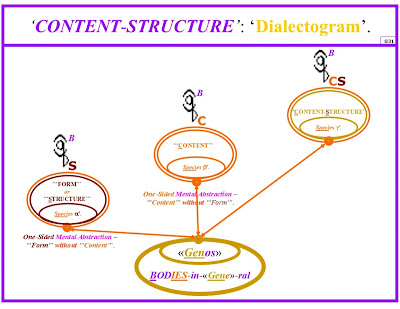




Leonardo’s Method: ‘ANA-LOGIC’.
Dear Reader,
This blog-entry draws from the documentary film “Leonardo
Da Vinci: The Universal Man”, directed by Francois Bertrand, and on
the words of Serge Bramly, author of the biography Leonardo da Vinci,
as follows –
“…Already during his time in Milan, Leonardo had
encyclopedic ambitions. …He even wrote: "It is easy to become
universal. If you know one thing, such
as the proportions of the human body, you can guess another, like the
proportions of the animal body."
-- Analogy is the fundamental system of
Leonardo’s thought.”
“He thought that the macrocosm reflects the microcosm [M.D.: ¿“As above, so below.”?], the small reflects the big.”
“For example, if you truly study the circulation of blood, it isn’t very complicated to understand how rivers drain by ramifying, like the arteries and the veins ramify. Or how arborescence makes trees grow, in one way and not another.”
“That system of analogies and concordances
allowed Leonardo to move constantly from one subject to another, from anatomy
to botany, to geology, to architecture,…”
Now, of course, in the dialectics
that we have presented to you here, one typically encounters what
we call ‘qualo-fractal meta-genealogical cumula’, that
are also ‘archéonic consecua’ -- that is finitary, but
scaled, self-similarity regresses, in which, in «aufheben»
fashion, all predecessor scales’ ontological content is contained inside that of
all successor scales, while also being elevated, in scale and complexity, and determinately
transformed, in each process of predecessor scale/level giving rise to higher,
successor scale/level.
There are also cases in which, synchronically, and all at the same scales, a Domain will exhibit a ‘content-structure’ in which each part contains a biased, distorted reflection of the Domain as a whole, and hence also of each of that Domain-whole’s other parts – an unscaled, and, again, finitary, mutual-similarities assemblage. This aspect of ontological ‘content-structure’ might be called ‘‘‘holographic’’’.
¡¡¡‘Similitude’ [but not ‘identicality’]
and analogy abound !!!
¡¡¡Hence also ‘Alternativity Abounds’ [Sophya St.
Germain]!!!
¡Enjoy!
Regards,
Miguel Detonacciones,
Voting Member, Foundation Encyclopedia Dialectica [F.E.D.];
Elected Member, F.E.D.
General Council;
Participant, F.E.D.
Special Council for Public Liaison;
Officer, F.E.D. Office of Public Liaison.
For
more information regarding the
Seldonian insights, please
see –
For partially pictographical, ‘poster-ized’ visualizations of many of these Seldonian insights – specimens of ‘dialectical art’
– as well as dialectically-illustrated books published by the F.E.D. Press, see:
https://www.etsy.com/shop/DialecticsMATH
YOU are hereby cordially invited to post your comments on this blog-entry below!






No comments:
Post a Comment